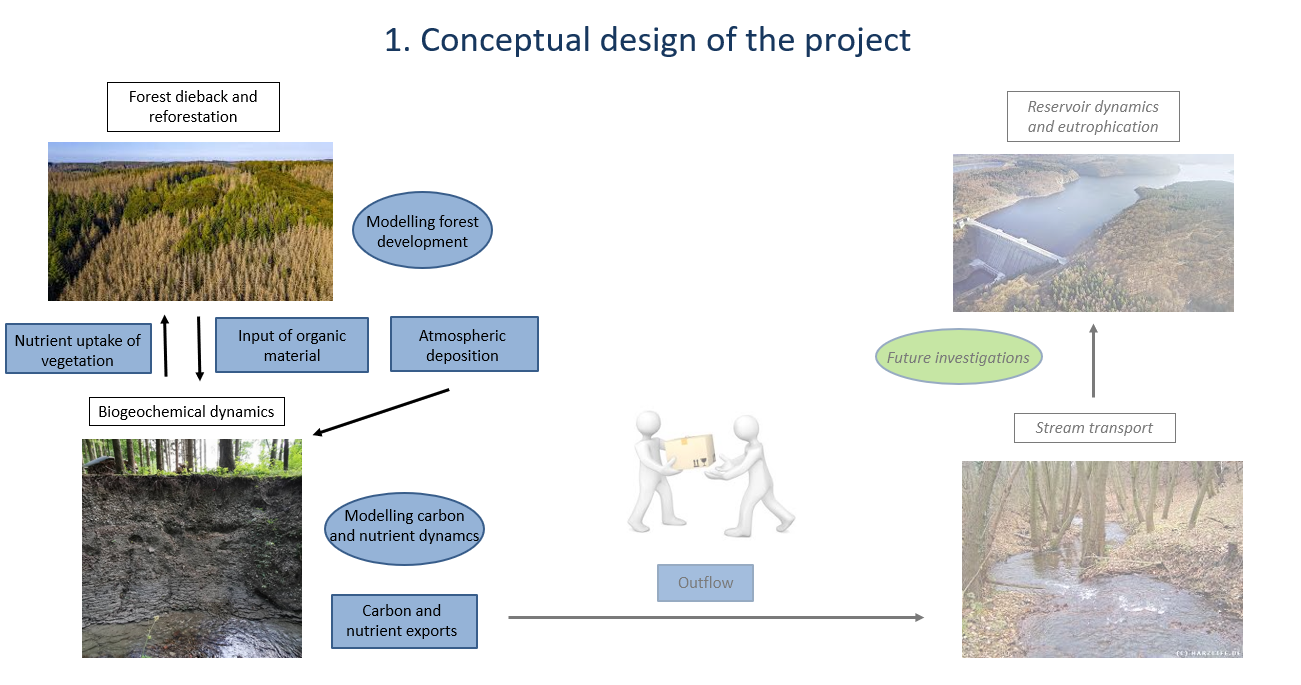Modelling the influence of alternative reforestation scenarios on carbon and nutrient leaching from forest sites after forest diebacks in the central-german Harz region
Headed by: Prof. Dr. Michael Rode, Prof. Dr. Karin Frank, Dr. Rico Fischer
Personel: Felix Sauke
Funding: Deutsche Bundesstifung Umwelt (DBU)
Period: 01.01.2024 - 31.12.2026
Contact:
michael.rode@ufz.de
,
felix.sauke@ufz.de

Climate change and its associated environmental changes represent a huge threat to the German forest communities, whereby the low mountain regions with a high proportion of coniferous monocultures, such as the Harz, record the highest forest damage in a nationwide comparison. As things stand at present, around 75% of the spruce trees in the Harz Mountains have died, with sometimes drastic consequences for carbon and nutrient leaching from forest stands and water quality in drinking water reservoirs. Various reforestation scenarios are therefore being discussed for the Harz region, e.g. reforestation with with coniferous monocultures, reforestation with mixed forest or leaving the dead forest areas to natural succession dynamics.
It is uncertain how the development of new forest communities will impact carbon and soil nutrient balances as well as carbon an nutrient exports from forested sites. Depending on the flow paths that connect soil water with groundwater and surface water, the carbon and nutrient dynamics in forest soils consequently also influence the quality of important water resources for drinking water supply. The planned research project addresses the interface between forest development, soil carbon and nutrient dynamics and water quality and is therefore highly relevant for practical forest management measures and drinking water treatment. To achieve this aim, a well-founded networking of different scientific areas at the Helmholtz-Centre for Environmental Research and other scientific institutes as well as our project partners from forest management and reservoir management in the Harz region is planned.
One aim of this research project is to carry out various scenario analyses for different climate and forest management scenarios. These scenarios will be used as the final product of the project to investigate the effects of different afforestation strategies on the development of forest productivity, soil carbon and nutrient balances, and carbon and nutrient exports through surface and subsurface runoff (dissolved organic matter, dissolved N and P compounds) until 2070.
It is uncertain how the development of new forest communities will impact carbon and soil nutrient balances as well as carbon an nutrient exports from forested sites. Depending on the flow paths that connect soil water with groundwater and surface water, the carbon and nutrient dynamics in forest soils consequently also influence the quality of important water resources for drinking water supply. The planned research project addresses the interface between forest development, soil carbon and nutrient dynamics and water quality and is therefore highly relevant for practical forest management measures and drinking water treatment. To achieve this aim, a well-founded networking of different scientific areas at the Helmholtz-Centre for Environmental Research and other scientific institutes as well as our project partners from forest management and reservoir management in the Harz region is planned.
One aim of this research project is to carry out various scenario analyses for different climate and forest management scenarios. These scenarios will be used as the final product of the project to investigate the effects of different afforestation strategies on the development of forest productivity, soil carbon and nutrient balances, and carbon and nutrient exports through surface and subsurface runoff (dissolved organic matter, dissolved N and P compounds) until 2070.
